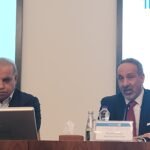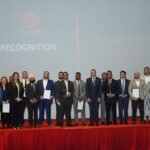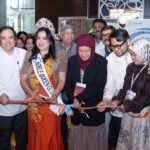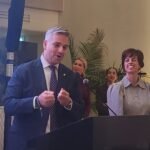Doha
29 Nov 2016
The third World Innovation Summit for Health (WISH) kicked off today presided by Sheikha Moza bint Nasser, Chairperson of Qatar Foundation (QF). Princess Lalla Salma, chairperson of Lalla Salma Foundation for Cancer Prevention and Treatment, Morrocco; and Princess Ghida bint Talal, chairperson of the board of trustees of the King Hussein Cancer Foundation (KHCF), Jordan were also present along with over 1,400 participants, including experts, policy makers and academics from over 100 countries. The conference lasts for two days at the Qatar National Center Doha.
In her opening remarks, Sheikha Moza bint Nasser acknowledged the new and diverse challenges facing the global healthcare community and the populations they serve, and expressed hope that the Summit would enable valuable collaboration.
She said: “All of our countries have a healthcare system, but none of them are perfect. Each country faces its own healthcare challenges. I hope that the participants in this year’s Summit will benefit from the research produced by WISH to improve their own health systems, and I hope that they will also use WISH as their platform for observing and monitoring policy reform in their own countries.”
Sheikha highlighted Qatar’s groundbreaking work in genomics and personalised medicine. Qatar Genome Programme, which was launched at the inaugural WISH in 2011, completed the sequencing of 3,000 Qatari genomes, a milestone that she noted will bring significant benefits to the local population.
“The ultimate aim of the Qatar Genome Programme is for it to bring tremendous benefit to patients. Working with partners, we are seeking to find ways to develop systems that will enable citizens’ genome data to be accessible to all health care centres, hospitals and clinics in order to provide efficient and customised treatment, while also guaranteeing the protection and confidentiality of patients’ health information,” Chairperson Qatar Foundation said.
The first day of the Summit featured policy briefings on universal health coverage and learning from international collaboration particularly on patient safety, as well as panel discussions on autism, health professional education, precision medicine, accountable care, behavioral insights, and genomics in the Gulf region and Islamic ethics.
Professor Lord Ara Darzi, Executive Chair of WISH, said: “WISH is a unique platform that brings together ministers, industry leaders, policy makers and academics to share our ideas, celebrate our successes and confront the common difficulties we face. WISH brings the world to Qatar and Qatar to the world. At WISH, it's real change that matters. Here, today, we have a global network of health reformers with a shared ambition: to make our health systems more responsive, with better quality and better value for money.”
Egbert Schillings, CEO of WISH, said: “WISH, now only in its third year, has firmly established itself as an indispensable part of the global healthcare leadership agenda. The leaders we convened are in Doha to engage with a unique body of knowledge, distinctive in both scope and depth. Today, we saw that the world will always come together to advance the cause of human health, as long as leaders are equipped with the ideas to do so and a platform that unites them. That is the essence of WISH and we are looking forward to the next chapter with even greater energy and commitment to improving the health of populations everywhere.”
In keeping with WISH’s goal of creating a global healthcare community, keynote speaker Dame Sally Davies, chief Medical Officer for England and a member of the World Health Organization’s executive board, urged delegates to work together to fight drug-resistant infectious diseases, which she said results in 700,000 deaths worldwide each year.
Dame Davies said: “These diseases are fuelled by the lack of a balance in antibiotics consumption that is fast becoming a major health disaster in the 21st century. It is imperative for us to move beyond the planning phase and take tangible actions to tackle this global epidemic. Continued awareness and education, ways to contain infections, optimised use of antibacterial drugs, innovation, and developing favourable market conditions are a few of the steps global policy makers have been agreeing to undertake in this process. I call on all the ministers, policy-makers and health professionals to work together towards innovating for a brighter future. We can change the world when we want to and when we choose to change.”
In the evening keynote talk, Dr Julio Frenk, President of the University of Miami and former Minister of Health for Mexico, discussed the challenges and opportunities created by the rapid proliferation of healthcare education.
“There has been an explosion in education and reform for universal healthcare coverage, which creates a unique set of opportunities for us to exploit. Transformative learning now means that healthcare professionals need to master the content and the context of the larger healthcare landscape in which they operate,” said Dr Frenk.
Several of the panels addressed healthcare concerns in Qatar, including autism, which came to the forefront locally in 2015 with the creation of a National Working Autism Group and the development of a National Autism plan.
Speaking about Qatar’s national strategy around autism, Muhammad Waqar Azeem, Chair of Department of Psychiatry at Sidra Research and Medical Centre, said: “The strategy is based on six pillars: awareness, timely screening, timely diagnosis, evidence-based interventions, the role of schools in the child's life and the transition into adulthood. These pillars are very important, and we are grateful to Dr Hanan Al Kuwari, Minister of Public Health, who is the force behind this strategy. Secondly, WISH, having an autism forum that unites all national stakeholders, is great success in itself.”
Above in Picture, Sheikha Moza bint Nasser (Left) is seen along with Lalla Salma (Red Dress), wife of King Mohammed VI of Morocco and Dr Hanan Al Kuwari, Minister of Public Health, Qatar









